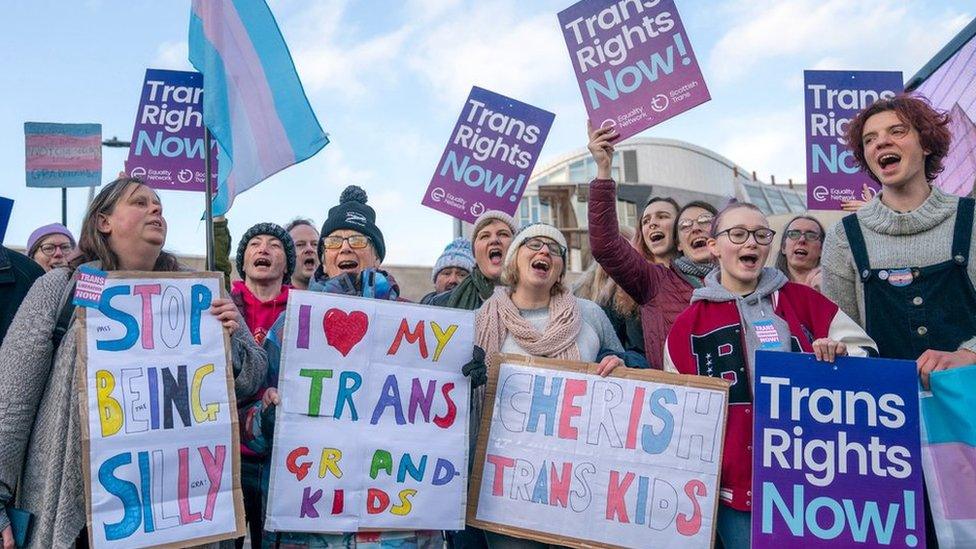'I was worried I'd start growing an Adam's apple'
- Published
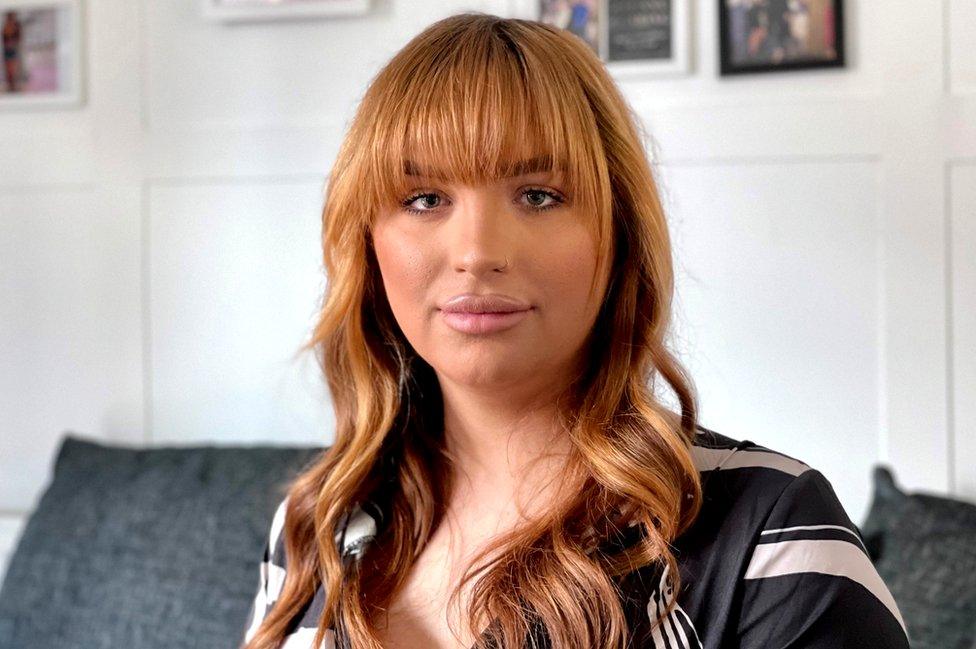
Maddi Maitland was eight years old when she realised she did not want to grow up as a boy.
She says she struggled to fit in and was bullied at school, and at the age of 15 came out as transgender.
Her family and school were supportive but she waited a year and a half to see an NHS specialist and a further six months to start hormone treatment to begin a physical transition.
Maddi is one of a growing number of people who have experienced long waits to see a gender specialist.
Scotland's chief medical officer, Dr Gregor Smith, has ordered a review of Scotland's gender reassignment protocol, acknowledging that services for transgender, non-binary and gender-diverse people require transformation.
In the 10 years since guidelines were first published, waiting times to access care at the country's five gender identity clinics have been rising. And a BBC Freedom of Information request shows that the number of under 18s on the waiting list for Scotland's only gender clinic for children has grown nearly six-fold in five years. It rose from 151 in 2017 to 903 in 2022.
The NHS defines gender dysphoria, external is a condition where a person experiences discomfort or distress because there is a mismatch between their biological sex and gender identity. It has been a recognised medical condition in the UK since 2002.
Maddi is 19 now and on a waiting list for gender reassignment surgery.
She told BBC Scotland: "It's hard because I couldn't get put on [puberty] blockers and I was really worried in case I started growing an Adam's apple, or I started sounding more deeper, or things would change like facial hair, that scared me."
After accessing hormone treatments, Maddi says she has had no further contact with the gender clinic despite being on a waiting list for reassignment surgery. Instead, she paid privately for chest reconstruction surgery and hopes to have further feminising genital surgery at the start of next year.
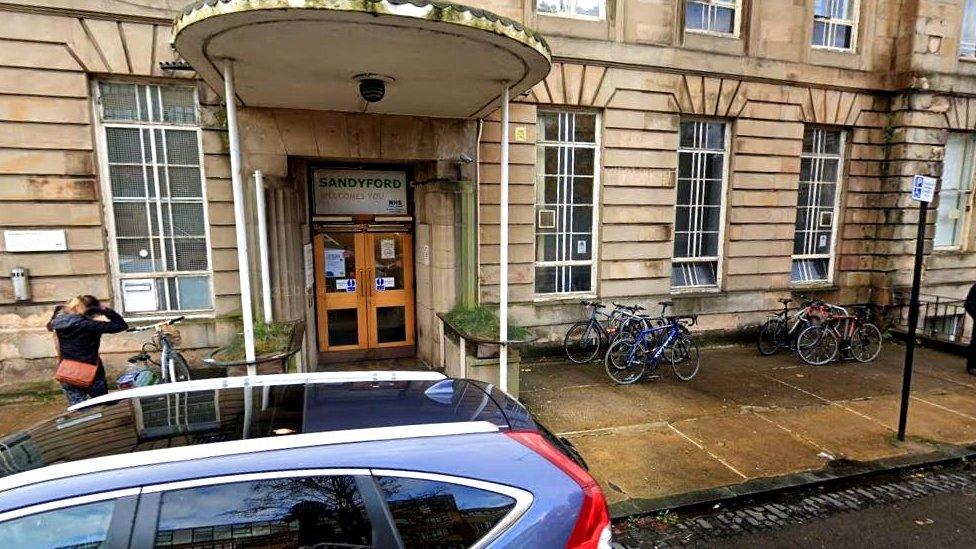
The Sandyford Clinic in Glasgow is Scotland's only specialist NHS gender clinic for children
The Sandyford clinic in Glasgow is the only specialist service for children. The average wait to see a clinician is two years and three months. There are concerns that such long waits just to see a specialist at a gender clinic are leading to more young people going online to access unregulated treatments.
Puberty blockers suppress sex hormones that effectively pause the process. They are considered to be physically reversible and will only be prescribed on the NHS by an endocrinologist after a full assessment. However, the full psychological effects of puberty blockers or whether they alter the course of adolescent brain development are not fully known.
Gender-affirming hormones such as oestrogen or testosterone are only prescribed in Scotland from the age of 16. They do cause some irreversible changes to the body - oestrogen will cause the growth of breast tissues while testosterone will cause the voice to break.
Puberty blockers
Maddi would like to see puberty blockers accessed more easily through GPs while people wait to get the support they need, saying she knows of people who have tried to get these drugs through unregulated websites.
"They are not getting support from the NHS," she said. "Their GPs are telling them to self refer and they are not hearing back for years. I know a lot of people who have done it and who are 19 now and still self medicating."
Last year, the chief medical officer ordered a comprehensive review of the gender reassignment protocol, external acknowledging it is an area that requires improvement. It is being carried out by The National Gender Identity Clinical Network for Scotland (NGICNS) which is expected to report to the Scottish government this summer.
Prof Richard Anderson is a reproductive endocrinologist at the University of Edinburgh who sits on the NGICNS steering committee.
He said: "When we are talking about prescribing testosterone or oestrogen we are using information for where we have been giving those for other medical indications for many years.
"These are really important hormones that affect the way your body is developing if you are starting to take them during puberty."
'Long overdue'
He added: "There needs to be an important discussion between the patient and whatever expertise you can access about what might be the long-term risks of this.
"At that sort of age these are really important decisions to be making. Even in adults, these gender-affirming hormone therapies may have significant health implications, they may be even be potentially risky under certain circumstances and it's really important the patients understand what is the right treatment for them."
Prof Anderson said he expected treatment guidelines to be revised as part of the review, making them easier for GPs and patients to access. He thinks this is long overdue.
"At the moment things are really pretty poor," he said. "We've had waiting time initiatives across other specialties but the gender services have not been resourced properly to deal with the current demand which is growing steadily.
"I really do think this review addresses all aspects of gender care and potentially could be transformative and bring it up to a modern effective and a service that we can be proud of offering in Scotland."
In the meantime, it is often GPs that distressed young people and their families turn to first. Dr Drummond Begg is a general practitioner in Penicuik. He said GPs could not start prescriptions without referring to specialists.
'No experience or expertise'
"We want to ensure that young people who experience gender dysphoria can have good conversation with people with real expertise in the area," he said.
"The problem is there are waiting times of up to three years before they get that conversation and as an average GP we simply do not have the experience or expertise to be taking on the assessment and advice on initial treatments should that be chosen. So I guess we feel like we are letting people down but frustrated by the waiting time."
A recent poll carried out for the BBC, external suggests 41% oppose children being offered those medical interventions that disrupt puberty (compared with 29% support and 30% saying they either had no opinion or didn't know). Savanta ComRes interviewed 2,038 people in Scotland aged 16+ online between 7 and 25 January 2022.
Treatment for gender dysphoria begins with counselling and psychological support. In Scotland, patients must be at least 18 to be eligible for surgery. They have to have specialist assessments and have lived as their gender for at least two years. However, those who want operations on the NHS have to travel to England as part of a national agreement between the two nations.
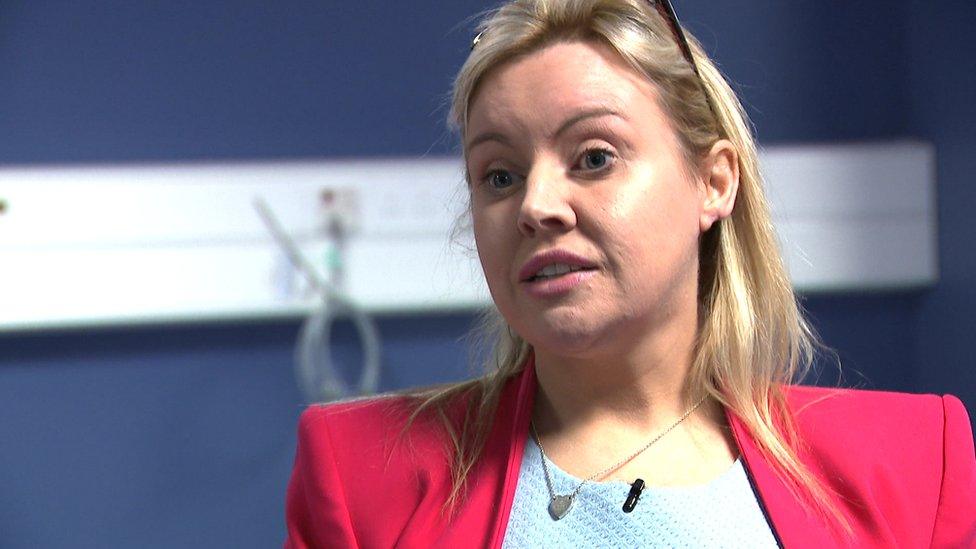
Gill Baird has set up a trust fund to help with private costs of gender reassignment procedures
St Ellen's hospital in Livingston is a new private facility that offers surgery to remove breast tissue, or create breasts for trans women. Its founder, Gill Baird, aims to offer genital surgery in the future.
She previously worked at the gender identity clinic in Glasgow and for the last four years has been going through a transgender journey with her own child, now aged 19.
She has set up a trust fund to help reduce the costs and make the surgery more accessible for eligible patients. It currently costs between £6,500 to £8,500.
'Surgery is irreversible'
She said: "Unfortunately, with private healthcare there are costs involved. We have surgeons' fees, operating fees, anaesthetic fees and we have to provide a safe ethical service as well, so unfortunately I can't offer it as not-for-profit unless the NHS would like to come and help me do that.
"At the moment, all I can do is offer a service at an accessible rate and help people through that process".
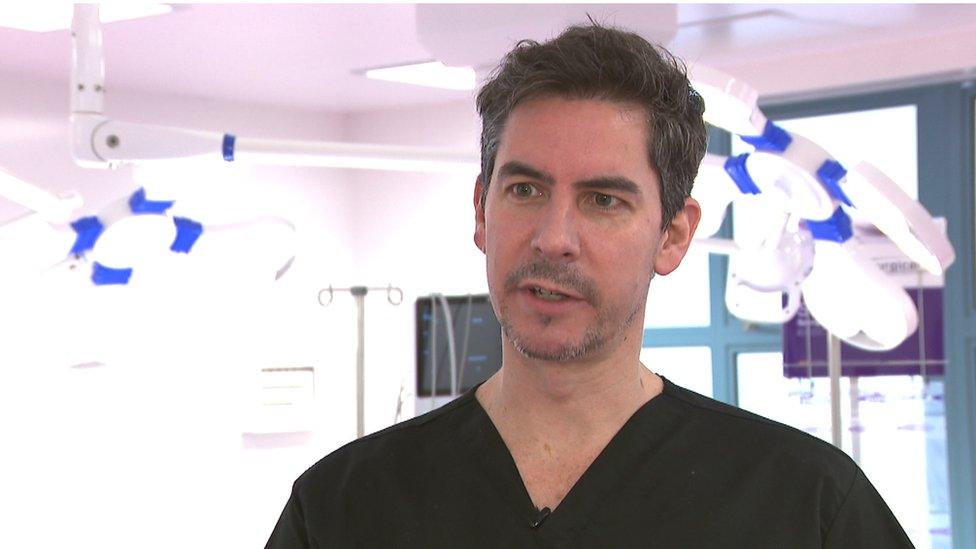
Plastic surgeon Daniel Widdowson specialises in chest reconstruction
Plastic surgeon Daniel Widdowson specialises in chest reconstruction and says it is important patients have followed the NHS pathway to ensure they are ready to transition.
He sees himself as the last point in the process.
"By that stage they have already been through the gender clinic," he said. "They've already seen the psychiatrist and psychologist and they've gone through the right process to enable us to do the right thing."
He said categorically that he and his colleagues would not consider surgery for those under 18.
"No, that's pretty straightforward from my point of view," he said. "The last thing you want to be doing is something where they've not been through that process, the multi-disciplinary team, we're talking medical professionals, family, and the length of time for that to happen is key and this is not a rash decision in the space of six months, a year or two years.
"We are talking many years because obviously the surgery is irreversible. You have to be sure you are doing the right thing"
Related topics
- Published17 February 2022
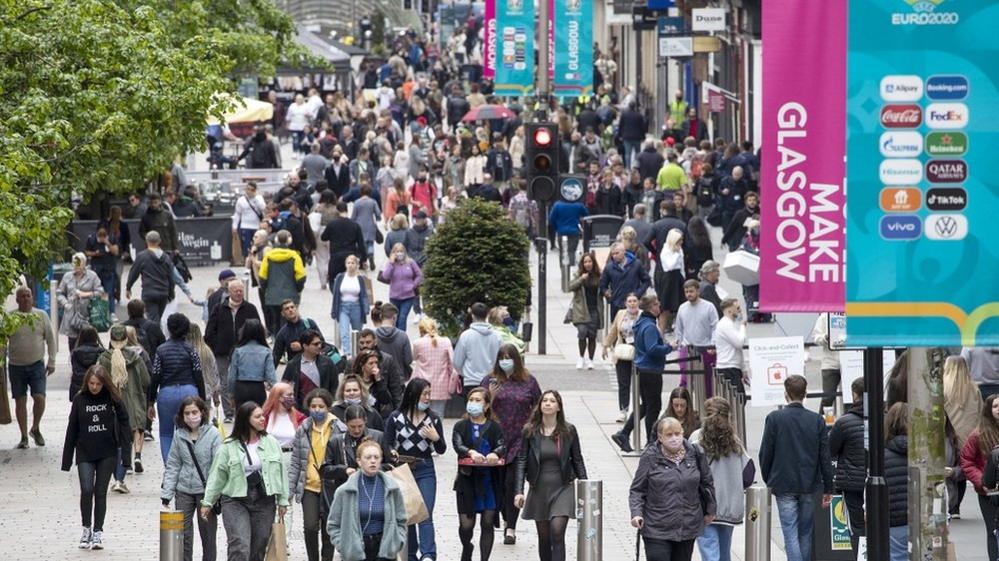
- Published17 February 2022

- Published8 December 2023
